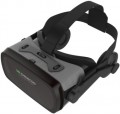Max. phone screen size
The largest diagonal of a smartphone compatible with the corresponding glasses (see "Intended use"). Note that this parameter can be specified both for universal models that do not have specialization for specific mobile phones, and for gadgets for specific devices (for more details, see "Compatible phone models"). The maximum diagonal is connected both with the features of the optics and with the physical dimensions of the "seat" for a mobile phone — a gadget that is too large simply does not fit there.
Note that even the smallest glasses for smartphones work quite correctly with devices with a diagonal of
5 – 5.5 ". So it makes sense to pay attention to this parameter if your device has a larger screen size. Nowadays, you can find glasses for gadgets
5.6 – 6 " and even
6" or more.
microUSB
The presence of a microUSB connector in the glasses. This is the most popular of the smaller versions of the USB connector, widely used primarily in portable technology. However, for a number of reasons, this interface is rarely found in VR glasses — in single models of glasses for a smartphone, as well as in some independent devices (see "Purpose"). In both cases, it is provided mainly for charging the built-in battery (glasses for smartphones can also have such power — for example, for the operation of built-in Bluetooth headphones).
Bluetooth
The presence of a
Bluetooth module in the glasses; The Bluetooth version to which this module corresponds can also be specified here.
Bluetooth is a technology created for direct wireless connection between various devices. This technology is found in all types of VR glasses (see “Purpose”), although most models with its support are independent devices. In any case, the most popular way to use Bluetooth in virtual reality glasses is to broadcast sound wirelessly. Moreover, the format of such a broadcast may be different, depending on the specifics of the glasses themselves. Thus, standalone devices broadcast the reproduced sound to external headphones. Models for PCs and smartphones may have built-in headphones, and here the sound is transmitted via Bluetooth to the glasses from an external device; Audio from the built-in microphone can be transmitted in the opposite direction.
In addition, there are other possible ways to use Bluetooth, such as directly exchanging files with another device or connecting game controllers. Such capabilities are found exclusively in stand-alone glasses; the specific functionality for each model should be clarified separately.
As for the versions, the oldest one used in VR glasses today is Bluetooth 3.0, the newest is Bluetooth 5.0. However, the differences between different versions for such devices are not fundamental; this information is provided mainly for reference purposes.
Control
The type of control provided in the design of the glasses.
Note that in this case we are talking exclusively about our own controls installed directly on the body of the glasses; many models are equipped with external controllers (see "Remote control"), but they are not taken into account in this case.
- Button. Control with classic buttons. The main advantage of this option is simplicity and low cost, while its functionality is quite enough to work with basic functions like menu navigation. On the other hand, the buttons require some effort when pressed, which can be somewhat inconvenient, especially when using the controls intensively. However, most often this disadvantage is still not fundamental.
- Touch. Control using sensors that are sensitive to touch and do not require pressing (unlike buttons). In the simplest models, these are separate sensors, the functions of which are similar to the same buttons. In more advanced devices, entire touch panels can be provided, for example, allowing you to control the cursor visible through the glasses and use special gestures. Anyway, this type of control is more advanced than push-button, however, it is more expensive, and therefore less common.

